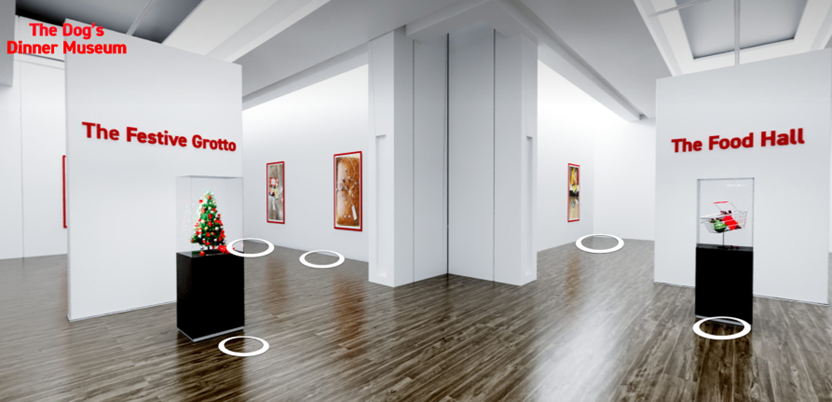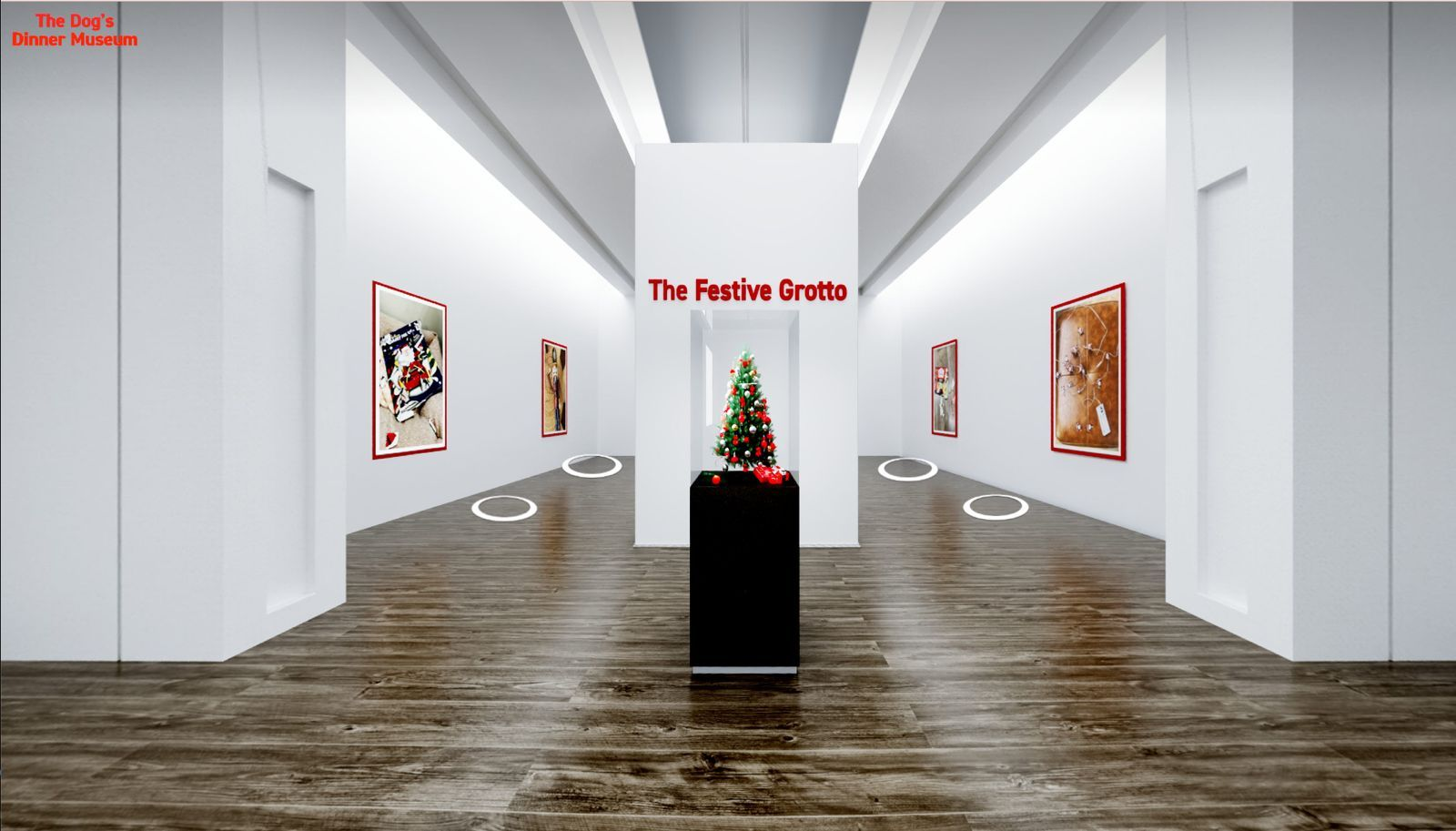Article
Puppy Predicaments: The Lesser Known At-Home Health Hazards

- Almost three-quarters (73%) of new puppy owners say their pet has swallowed something it shouldn’t, leading to an emergency vet visit
- Over two-fifths (41%) of December vet visits are caused by dogs swallowing items that are harmful to them
- A quarter of these visits stem from consumption of Christmas decorations, 44% from kids toys or small objects, and almost a third (32%) from festive foods
- Over two-thirds (67%) of puppy owners aren’t aware that a traditional Christmas dinner can be harmful to their dogs
- “The Dogs Dinner Museum”, a new digital exhibition created by Royal Canin, showcases the surprising household items, food and festive goods to keep away from your puppy - with advice from leading experts on the importance of puppy specific nutrition and how to keep your furry companion safe and healthy during the holiday season and beyond
Puppies are naturally playful, but their curiosity, heightened sense of smell and impulse to chew, often leads them to eat every day, hazardous items that they shouldn't. On average owners report visiting the vet an average of 2-3 times throughout the puppy stage, due to these risky encounters.
New research reveals almost three quarters (73%) of new puppy owners say their pet has swallowed, or attempted to swallow something that has resulted in an emergency vet visit. 69% of dog owners reported their pets to have ingested non-food items like household objects, while more than half (52%) have swiped hazardous human foods - potentially resulting in a poorly puppy and trip to the vets.
The research from the science-backed pet nutrition brand with over 50 years expertise, Royal Canin, found that while more than half of owners (58%) are aware chocolate is a big ‘no-no’ for dogs, a further half (54%) say they don’t remove gift-wrapped items with harmful contents, like chocolate, from under the Christmas tree - giving their pups a chance to get into these harmful goods.
With Christmas upon us, puppy owners are encouraged to be even more thorough in proofing their homes, as data reveals the most common misstep from puppy owners is to offer their dog a festive treat and a try of the iconic Christmas dinner. With onions and garlic regularly used in the traditional meal, roughly two-thirds (67%) of owners are unknowingly putting their dogs at risk.
During the holiday season (December), the most common cause for emergency vet visits can be put down to dogs having swallowed something dangerous (41%) alongside showing symptoms of poisoning or toxicity (29%).
Over a quarter of doggie vet visits come from Christmas decorations (25%), kids toys or small objects (44%), and almost a third (32%) from festive foods, including chocolates (22%), grapes or raisins (31%) mince pies (3%), and even alcohol (6%).
Shining a light on the standard household items, festive decorations and food items that pose a danger to puppies, a digital exhibition, ‘The Dog’s Dinner Museum’ has launched to help pet owners protect their pups. The exhibition also features a comprehensive hub of nutritional and health advice so pet owners can make informed choices about their dog’s diet and well-being.
Other surprising foods that are toxic to dogs include avocados, where almost three quarters (70%) didn’t know they were dangerous for dogs, and 71% of owners were unaware of the hidden risks posed by bread dough.
“As many first-time puppy owners prepare for their furry friends' first festive season, we want them to be armed with the knowledge to help their pets avoid hazardous items and enjoy the right nutritionally balanced food tailored to the needs of a growing puppy”, said Dr Lauren Hayes BVetMed MRCVS, a veterinarian at Royal Canin said “With almost a quarter (24%) unsure how to puppy-proof their homes, nearly half (45%) of puppy owners relying on advice from family or friends with dogs when it comes to their pup’s nutrition and safety, and 28% turning to sources like social media, Royal Canin is here to support pet owners with expert-backed advice developed by leading experts and tailored nutrition plans.
“While social media is convenient and popular, they often lack the scientific backing and expert insight that only a veterinarian can provide — potentially leaving gaps in critical care decisions for their canine companions.
“It can be tempting to treat our furry friends to the same things we enjoy at Christmas, but it's important for puppies to stick to a tailored, puppy specific diet that can support rapid growth and ongoing development of their immature digestive and immune functions. So, whilst we love the taste of our Christmas dinner, it actually doesn’t taste of much to our canine companions: contrary to popular belief, dogs don’t have anywhere near the amount of taste buds as us humans! Rely on expert advice and science-backed tips to keep your furry friends happy and healthy long after the festive season is over. Puppy nutrition is not just for Christmas, afterall!”
Elsewhere in the research, over 25% of the common household items that puppies were reported to have chewed on included electrical items such as watches, batteries, cords, or lights. However, chocolate came up trumps in the list of all items (both food and non-food), with 20% of respondents noting their puppies had a real sweet tooth.

Royal Canin has teamed up with a leading veterinary nurse and researcher at the University of Liverpool Small Animal Teaching Hospital, Georgia Woods-Lee to identify the top ten items that can jeopardise your puppy’s digestive health, along with expert advice and tips for puppy owners nationwide:
- Chocolate-Free Zone: Gift-wrapped chocolate can be a hidden danger, especially with a puppy’s sharp sense of smell leading them to sniff out sweets even when hidden. Let family members and guests know not to place chocolate or any toxic foods under the tree and keep advent calendars stored well out of your puppy's reach.
- Guest Alert!: Remind family and friends (especially the kids!) not to sneak your puppy any holiday treats without checking first, puppies store fat differently, and eating too much makes them more prone to obesity as adults, so it’s really important to feed them the correct nutrition at this time in their life.
- Twinkling Temptation: Christmas lights, glowing in all their festive glory, can become a dangerous game of ‘chew the cord’ for an adventurous puppy. But what starts as a curious nibble could end with painful electrical burns. Puppies often chew out of curiosity, teething, boredom, or even separation anxiety—so it’s important to provide plenty of safe chew toys and stimulation to keep them engaged and away from hazards.
Georgia Woods-Lee, a leading veterinary nurse and researcher at the University of Liverpool Small Animal Teaching Hospital, emphasises the importance of staying vigilant during the first few months of being a dog-parent: “Puppies are naturally curious and can be quite mischievous, particularly during the lead up to Christmas. While it’s heartwarming to see them explore their new environment, it’s crucial for pet owners to be mindful about what their puppies are chewing on. Many poisonous foods, miscellaneous items and holiday decorations can pose health risks if ingested. Educating yourself about these hazards and ensuring your puppy has a balanced diet, tailored to their breed and age, is vital for optimal health and development.”
Choose Puppy-Specific Food
Over half of puppy owners are not feeding their pets a puppy-specific diet. It’s crucial to choose high-quality, breed-specific puppy food that provides the essential nutrients for growth and development. Visit www.royalcanin.com to explore tailored nutrition plans and resources that will help you provide your puppy with a balanced diet for optimal health and development.
Treat with Care
Puppies have developing digestive systems, meaning giving your puppy rich foods can cause digestive upset. Always give small bits of treats to avoid obesity and ensure ‘treating’ accounts for no more than 10% of your puppies daily food intake.
Consult your veterinary practice
Regular vet practice visits can provide personalised advice on your puppy's nutritional needs and help you make informed choices for their diet.
Stay Hydrated
Ensure your puppy has access to fresh water at all times. Proper hydration is key to overall health and supports digestion.
For all press enquiries please contact: [email protected]
Methodology
Consumer research
Consumer research conducted with XX, across 2,000 UK dog owners between XX and XX.
About Royal Canin
ROYAL CANIN® is a division of Mars Petcare and a global leader in health nutrition for cats and dogs.
Founded over 50 years ago by a French veterinarian, Dr.Jean Cathary, Royal Canin’s purpose is to make A BETTER WORLD FOR PETS™ by pushing the limits of nutrition and knowledge in partnership with pet professionals and experts.
Royal Canin works closely with pet professionals, such as breeders and veterinarians, not only to design the most precise nutrition for cats and dogs, but also to develop a variety of services, monitoring and diagnostic tools to help understand and care better for them.
Its unique approach places cats and dogs’ nutritional requirements at the heart of the innovation process. Their age, lifestyle, size, breed, sensitivities and activity level are studied through science and observation in order to produce diets for each pet’s specific needs.
To learn more about the Royal Canin company, visit www.royalcanin.com
Like & share this page